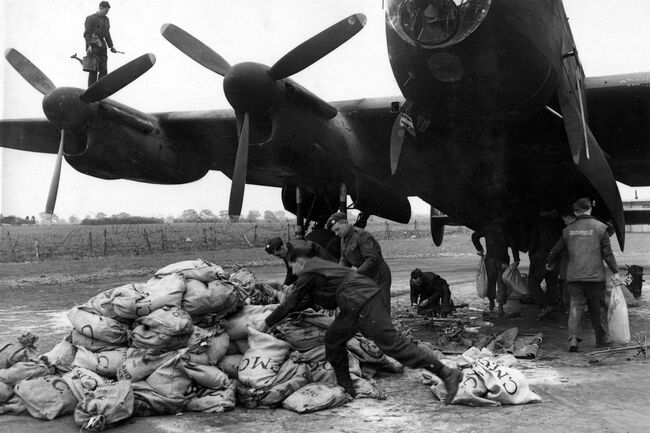
Commemorating the 80th anniversary of Operation Manna
Published:
Categories:
Eighty years ago today a group of young pilots and their crews began a series of daring raids which saved a starving nation. The Operation Manna food drops over the Netherlands became one of the first humanitarian aid missions undertaken by the Royal Air Force in the dying days of the Second World War.
Just days away from VE Day, German occupation, along with flooded farmland and blocked supply lines, had taken such a toll on the Netherlands and its people that they were dying in their thousands. In response to the crisis, the Allied Forces requested to drop supplies and German forces agreed to a ceasefire if the aircraft remained on course.
For 10 days, the RAF dropped tinned food and supplies on designated landing sites. They were joined by the US Air Force, who codenamed the flights Op Chowhound, and together more than 11,000 tonnes of food were dropped.
Rear gunner Alastair Lamb was flying in Lancasters with 15 Squadron at the time. He said in an old interview with the Fund: "The pilots were looking forward to flying so low and being allowed to do so! It was quite a thrill to have such a great view out of the back of the Lanc. I used to joke if the pilot went too low over the sea I’d be getting wet.
"When we got over the Netherlands I could see the people below. The Dutch were told to stay away from the drop zones, but they were all over them! It was quite a sight."
Alastair's crew dropped supplies like flour, margarine, milk powder and sausages at Rotterdam, Valkenburg and the Hague. To be able to drop the goods without damaging them, as none of the supplies had parachutes, the Lancasters were flying as low at 500 feet.
Alastair added: "It was the most exciting part of my RAF career, because we were able to fly so low. It was a job we did. We were young and stupid, we just did the job we were supposed to do."
Having joined the RAF towards the end of the war as soon as he was old enough, Alastair went on to serve until 1947. After Op Manna he was involved in repatriation flights for prisoners of war and troops left stranded after VE Day as well as flying to Italy and France.